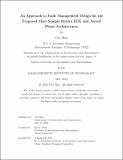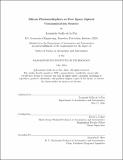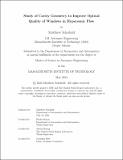MIT Theses
This collection of MIT Theses in DSpace contains selected theses and dissertations from all MIT departments. Please note that this is NOT a complete collection of MIT theses. To search all MIT theses, use MIT Libraries' catalog.
MIT's DSpace contains more than 58,000 theses completed at MIT dating as far back as the mid 1800's. Theses in this collection have been scanned by the MIT Libraries or submitted in electronic format by thesis authors. Since 2004 all new Masters and Ph.D. theses are scanned and added to this collection after degrees are awarded.
MIT Theses are openly available to all readers. Please share how this access affects or benefits you. Your story matters.
Contact
If you have questions about MIT theses in DSpace, mit-theses@mit.edu. See also Access & Availability Questions or About MIT Theses in DSpace.
If you are a recent MIT graduate, your thesis will be added to DSpace within 3-6 months after your graduation date. Please email mit-theses@mit.edu with any questions.
Permissions
MIT Theses may be protected by copyright. Please refer to the MIT Libraries Permissions Policy for permission information. Note that the copyright holder for most MIT theses is identified on the title page of the thesis.
Theses by Department
- Comparative Media Studies
- Computation for Design and Optimization
- Computational and Systems Biology
- Department of Aeronautics and Astronautics
- Department of Architecture
- Department of Biological Engineering
- Department of Biology
- Department of Brain and Cognitive Sciences
- Department of Chemical Engineering
- Department of Chemistry
- Department of Civil and Environmental Engineering
- Department of Earth, Atmospheric, and Planetary Sciences
- Department of Economics
- Department of Electrical Engineering and Computer Sciences
- Department of Humanities
- Department of Linguistics and Philosophy
- Department of Materials Science and Engineering
- Department of Mathematics
- Department of Mechanical Engineering
- Department of Nuclear Science and Engineering
- Department of Ocean Engineering
- Department of Physics
- Department of Political Science
- Department of Urban Studies and Planning
- Engineering Systems Division
- Harvard-MIT Program of Health Sciences and Technology
- Institute for Data, Systems, and Society
- Media Arts & Sciences
- Operations Research Center
- Program in Real Estate Development
- Program in Writing and Humanistic Studies
- Science, Technology & Society
- Science Writing
- Sloan School of Management
- Supply Chain Management
- System Design & Management
- Technology and Policy Program
Collections in this community
Recent Submissions
-
An Approach to Fault Management Design for the Proposed Mars Sample Return EDL and Ascent Phase Architectures
(Massachusetts Institute of Technology, 2024-05)The Mars Sample Return (MSR) campaign aims to bring Martian regolith samples back to Earth. JPL is currently developing the Sample Retrieval Lander (SRL) to receive the samples collected by the Perseverance rover and launch ... -
Silicon Photomultipliers as Free Space Optical Communication Sensors
(Massachusetts Institute of Technology, 2024-05)Free-space optical communications (FSOC) is a growing field that presents an attractive alternative to the the current technology standard of radio frequency (RF) communications. Typical optical carriers have smaller SWaP ... -
Study of Cavity Geometry to Improve Optical Quality of Windows in Hypersonic Flow
(Massachusetts Institute of Technology, 2024-05)The optical quality of the window-air system of a flight vehicle in hypersonic flow is simulated. The optical distortion of the window-air system is the metric of merit. Within the earth’s atmosphere, vehicles at hypersonic ...


